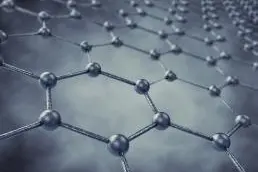PHOTO
Researchers at Masdar Institute Add Value to Lockheed Martin's Carbon Nanostructures by Developing Advanced Materials with Higher Thermal-Electrical Conductivity
Abu Dhabi-UAE: 20 September, 2016
Researchers at the Masdar Institute of Science and Technology have developed a novel type of "buckypaper" - a thin film composed of carbon nanotubes - that has better thermal and electrical properties than most types of buckypaper previously developed. Researchers believe the innovative buckypaper could be used to create ultra-lightweight composite materials for numerous aerospace and energy applications, including advanced lightning strike protection on airplanes and more powerful lithium-ion batteries.
Masdar Institute's Associate Professors of Mechanical and Materials Engineering Dr. Rashid Abu Al-Rub and Dr. Amal Al Ghaferi, along with Post-Doctoral Researcher Dr. Hammad Younes, developed the buckypaper with carbon nanostructures provided by global security, aerospace, and information technology company Lockheed Martin. A paper on their research was published earlier this year in the journal Diamond and Related Materials. The paper was co-authored by Masdar Institute PhD student Mahfuzur Rahman and Mechanical Engineering MSc alumni Ahmed Dalaq.
The black, powdery flakes provided by Lockheed Martin's Applied NanoStructured Solutions (ANS) contain hundreds of carbon nanotubes, which are one-atom thick sheets of graphene rolled into a tube that have extraordinary mechanical, electrical and thermal properties. Lockheed Martin's carbon nanostructures are unique because the carbon nanotubes within each flake are all properly aligned, making them good conductors of heat and electricity.
"Lockheed Martin's carbon nanostructures have many potential applications, but in its powdery form, it cannot be used. It has to be fabricated in a way that keeps the unique properties of the carbon nanotube," explained Dr. Al Ghaferi. "The challenge we faced was to create something useful with the carbon nanotubes without losing any of their unique properties or disturbing the alignment."
Dr. Younes said: "Each flake is a carbon nanostructure containing many aligned carbon nanotubes. The alignment of the tubes creates a path for conductivity, much like a wire, making the nanostructure an exceptionally good conductor of electricity."
The Masdar Institute team mixed the carbon nanotubes with a polymer and their resulting buckypaper, which successfully maintained the alignment of the carbon nanotubes, demonstrated high thermal-electrical conductivity and superior mechanical properties.
"We have a secret recipe for self-aligning the carbon nanotubes within the buckypaper. This self-aligning is key in significantly enhancing the electrical, thermal and mechanical properties of our fabricated buckypapers," explained Dr. Abu Al-Rub.
Despite their microscopic size - a carbon nanotube's diameter is about 10,000 times smaller than a human hair - carbon nanotubes' impact on technology has been huge. At the individual tube level, carbon nanotubes are 200 times stronger, five times more elastic, and five times more electrically conductive than steel.
Because of their extraordinary strength, thermal and electrical properties, and miniscule size, carbon nanotubes can be used in a number of applications, including ultra-thin energy storage devices, smaller and more efficient computer chips, photovoltaic solar cells, flexible electronics, cancer detection, and lightning-resistant coatings on airplanes.
According to a report by Global Industry Analysts Inc., the current global market for nanotubes is pegged at roughly US$5 billion and its market share is growing sharply, reflecting the rising sentiment worldwide in carbon nanotubes' potential as a wonder technology.
Masdar Institute's efforts to capitalize on this emerging technology have resulted in several cutting-edge carbon nanotube research projects, including an attempt to create carbon nanotube-strengthened concrete, super capacitors that can hold 50 times more charge, and a membrane that can bind organic micro-pollutants.
As the UAE moves towards a clean energy future, innovations in renewable energy storage systems and other sustainable technologies are crucial for the country's successful transition, and researchers at Masdar Institute believe that carbon nanotubes will play a huge role in achieving energy sustainability.
-Ends-
About Masdar Institute
The Masdar Institute of Science and Technology (Masdar Institute) was established by the government of Abu Dhabi as a not-for-profit, private graduate university to develop indigenous R&D capacity in Abu Dhabi addressing issues of importance to the region.
In collaboration with the Massachusetts Institute of Technology (MIT), Masdar Institute has developed an academic and research platform that articulates its mission and vision according to critical energy and sustainability challenges.
An important characteristic of Masdar Institute is its focus on complex real-world problems that require a multidisciplinary approach for the development of solutions from an integrated technology, systems and policy perspective. This multi-interdisciplinary and integrated approach is supported by the structure of its academic programs and by the emphasis placed on engaging external partners from industry, government, and other academic institutions in collaborative activities.
Serving as a key pillar of innovation and human capital, Masdar Institute remains fundamental to Masdar's core objectives of developing Abu Dhabi's knowledge economy and finding solutions to humanity's toughest challenges such as climate change.
Masdar Institute integrates theory and practice to incubate a culture of innovation and entrepreneurship, working to develop the critical thinkers and leaders of tomorrow. With its world-class faculty and top-tier students, the Institute is committed to finding solutions to the challenges of clean energy and climate change through education and research.
Masdar Institute offers degrees in:
· MSc Engineering Systems and Management
· MSc Computing and Information Science
· MSc Materials Science and Engineering
· MSc Mechanical Engineering
· MSc Water and Environmental Engineering
· MSc Microsystems Engineering
· MSc Electrical Power Engineering
· MSc Chemical Engineering
· MSc Sustainable Critical Infrastructure
· PhD in Interdisciplinary Engineering
Please visit our website www.masdar.ac.ae/
For more information contact:
Name: Shaima Al Jarman
Director - Marketing & Communications
Public Affairs Department
Email: saljarman@masdar.ac.ae
Phone: +971 02 810 9365
© Press Release 2016




















